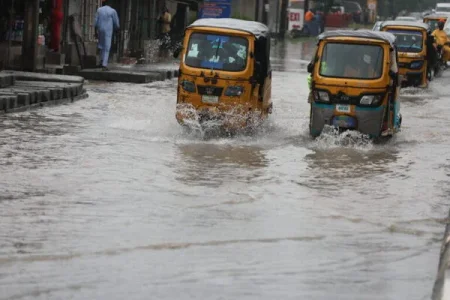
The Nigerian government warns of severe flooding in 20 states, potentially worsening cholera outbreaks. With 63 deaths and over 2,000 suspected cases, officials urge states to clear drainages and improve sanitation to prevent further disasters.
The Federal Government has issued a warning that approximately 20 states will face severe flooding in July, which could exacerbate the spread of cholera. The Minister of Water Resources and Sanitation, Joseph Terlumum, raised these concerns during a press conference on Thursday, urging state governments to clear blocked drainages to mitigate the impact.
As of July 3, 2024, there have been 63 deaths and 2,102 suspected cholera cases due to recent floods and heavy rainfall. Terlumum emphasized the need for immediate action from state and local governments to prevent further flood-related disasters, especially as the peak flooding season approaches. Several states, including the Federal Capital Territory (FCT), have already experienced significant flooding, resulting in casualties and displacement.
The minister noted that no water has been released from dams within and outside Nigeria, including Kainji and Jebba Dams on the River Niger, where water levels are still rising. He warned that river flooding is expected to intensify this month, particularly affecting states such as Akwa Ibom, Anambra, Adamawa, Benue, Bayelsa, Cross River, Delta, Edo, Jigawa, Kogi, Kebbi, Kaduna, Niger, Nasarawa, Ondo, Ogun, Rivers, Taraba, and the FCT.
Terlumum advised clearing blocked drainage systems and desilting river channels to manage runoff water effectively. This recommendation follows a significant rise in cholera cases, as reported by the Director-General of the Nigeria Centre for Disease Control (NCDC), Jide Idris. He highlighted that 63 deaths and 2,102 suspected cases have been recorded across 122 local government areas in 33 states and the FCT.
The cholera outbreak has been linked to contaminated food and water, compounded by poor sanitation and widespread open defecation. Despite these challenges, Idris expressed confidence in the country's ability to contain the outbreak, citing the activation of the National Cholera Multi-Sectoral Emergency Operations Centre (EOC) to coordinate a robust response.
The NCDC has identified several obstacles in combating cholera, including inadequate sanitation facilities, poor waste management, and low awareness of basic hygiene practices. Improved regulation and enforcement of public health laws are crucial to addressing these issues and preventing further outbreaks. The urgent need for comprehensive measures to tackle both flooding and cholera in Nigeria is evident as the nation faces these dual challenges.




